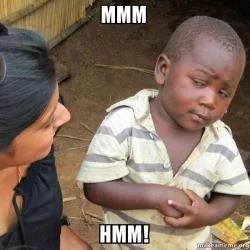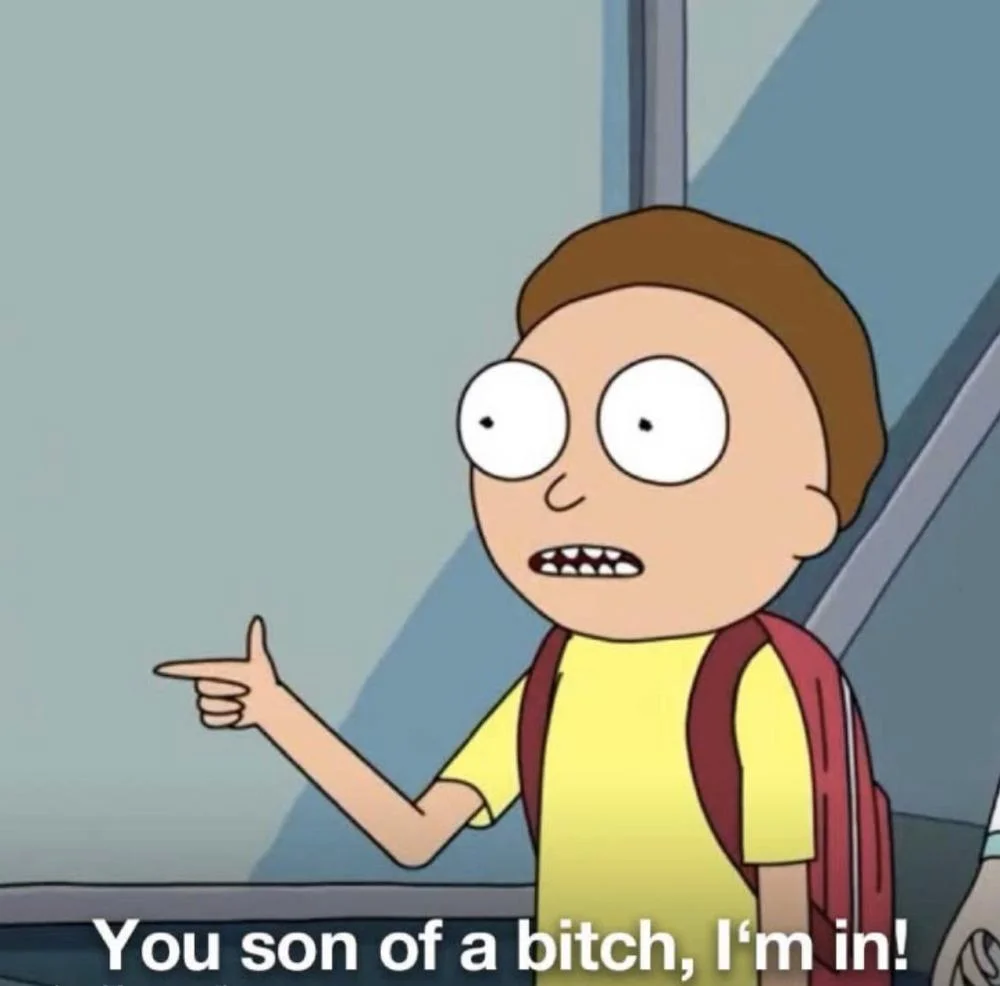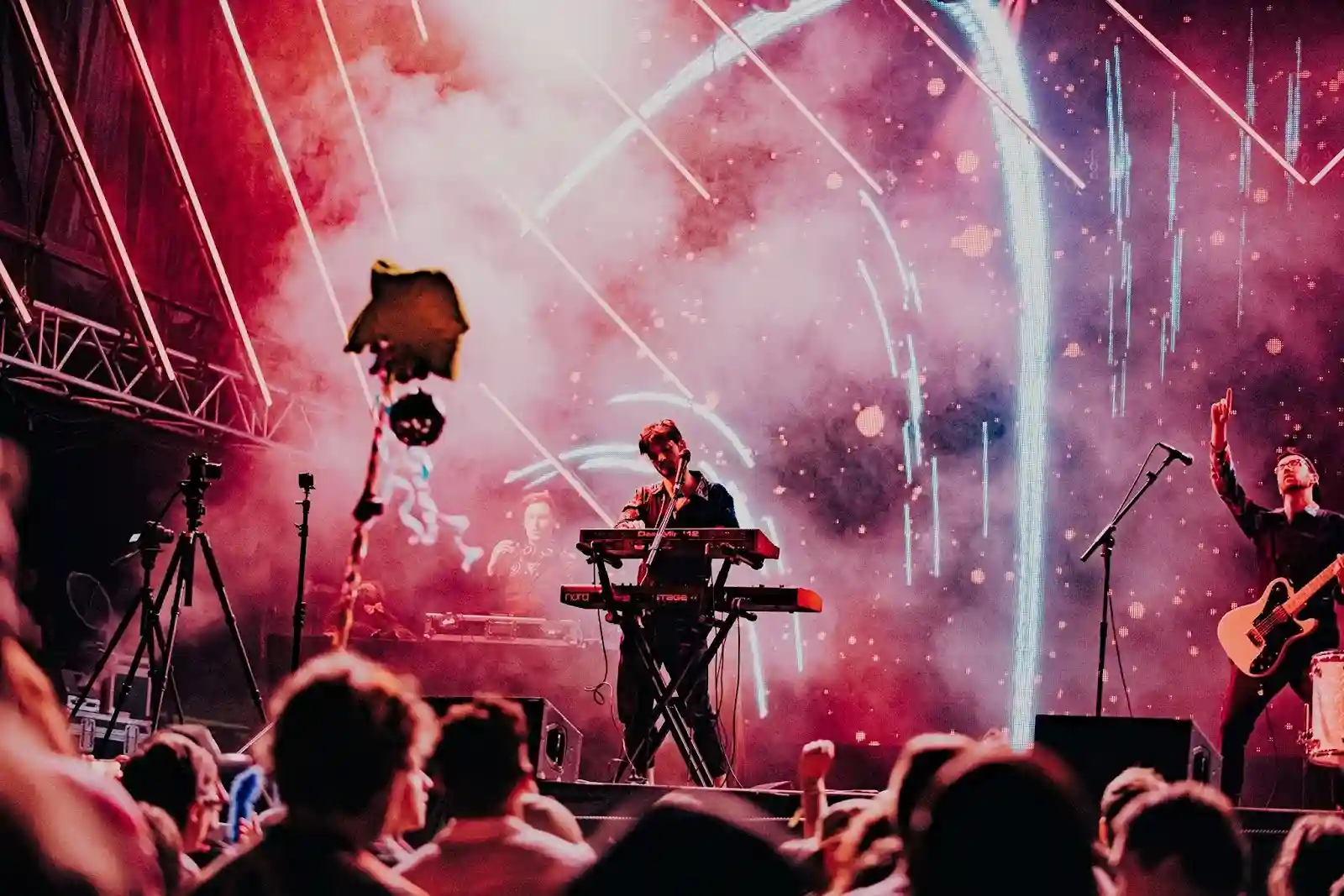Building a team for success in the music industry
While there are many solo-name artists out there, and it may appear as though they do everything themselves, almost every major musical artist ever has had an entire team working with them to achieve success.
This article is for those wanting to go pro with their original music. Hobbyists, who do musical purely for the joy of it, may not need to read this, as they are already at the place they want to be :)
Are you a brand new artist ready to make your mark?
Unchained Music helps you build a successful career by giving you the tools to manage your own network and distribute your music on major platforms. Start today and get your music out there with unlimited releases and pure freedom to grow your brand and build your fanbase.
Start Distributing Your Music with Unchained Music!
I'll be sharing insights I have learned from taking my band, Beacon Bloom, from a garage project to playing big festival stages with 1 million streams+ (only possible with a team!)
Before we get into the specifics, let’s start with a simple principle:
Inspire Others
Unless you already have a large following, have achieved some success, or have large sums of money (which still does not guarantee the success of a project), you will likely be starting from scratch.
And if budgets are low, there is only one key currency that will motivate people to work for you - that is, inspiration.
The question is - how to go from this:

To this:

And the answer is inspiration.
Present a vision to people.
Show them your passion.
And do the work.
This means setting achievable goals and reaching them (playing a local show, getting a few thousand streams, making a fully produced professional sounding track, etc).
Showing is always more powerful than telling. If you deliver on your vision, and potential team members can join you in that journey, they are much more likely to stick around.
Music, at its highest, is about creating something larger than ourselves.
Many people yearn to be a part of something greater than themselves, that resonates with others. That makes them and others feel something. If you can be the driving force for that, you will find others that will join you in that mission.
So create, and improve your art until it inspires others. And keep inspiring them. That’s your job as a musical project leader.
The Team.
Many musical projects work with the following (in no particular order):
- Manager
- Photographer
- Videographer
- Graphic Designer
- Social Media Manager
- Marketer
- Producer
- Mixing Engineer
- Mastering Engineer
- Copywriter
- Booking Agent
etc etc.
This list can be daunting.
But do not fear, we’re going to break these down into smaller chunks.
Some artists already have some of these skills, or can learn them (with the bonus of extra income if they learn one of the skills, for example, graphic designer). Some have friends or family that can assist etc. How, and how quickly the team is formed doesn’t matter as much, what matters is eventually having each of these to call on, to get the artistic vision happening.
Photography
Professional photography goes a huge way. Professionals in the industry will take an artist more seriously if they have proper photography, for both press images and live photos.
Often professional photographers aren’t super expensive, and local ones can often be found via Instagram. If one is on a tight budget, a friend with a good eye, a relatively good smartphone and good lighting can work in a pinch. But usually a pro DSLR gets better results.
You can make a photoshoot go a long way, by bringing different outfits, and shooting in several locations in close proximity to each other, all in a single shoot. In this way, you can refresh your profile pictures/press pictures several times from a single shoot.
If you land a live show, with a good sized crowd, a pro photographer can be a great investment, these photos look great for future bookings.

Videography
Investment in a great music video, or live music video that is professionally shot, not just on a good camera, but by someone with an eye for videography and composition, can be invaluable for interacting with the industry.
Beacon Bloom landed a bunch of festival slots with this video alone, which at the time cost us around $250 USD to make - a friend of ours shot the video.
Budget Tip: Smartphones are so good these days, that with good lighting, and creativity, a great live video could be shot on one.
Graphic Design
Too many times I have seen artist logos and branding that isn’t up to scratch - this can leave an immediate amateur impression, which can colour the impression of the music.
While it would be nice if the music would speak for itself, this unfortunately often isn’t the case, and first impressions do make their mark.
And so, having a professional, cohesive brand is very useful for an artist. A useful way to approach this is to ask “which universe is this music coming from? Which era? What type of colours? Day or night? Modern or Vintage?”
From this universe, inspiration and visual ideas can flow.
If you are not in a position to create a full brand kit, at the very least, having a professionally designed Logo will make a great impression when interacting with the industry. This can be used on album art, in your email signature, on socials, tour posters, videos etc. A good place to start is to collect a bunch of logos of artists you like. Then, taking inspiration from those, create your own.
You can either hire a designer to make a logo for you, or try your hand yourself with something like Canva. Just ensure it looks professional - if you’re unsure, that’s when it’s a good idea to ask for help from a friend. Likewise there are many pros in the Unchained Music Community Discord who can provide valuable tips and feedback.
Production
Production quality is incredibly important.
While some genres can get away with more amateur-sounding production, in most cases, to compete in the global market, your productions must be at a professional level. This is also key to inspiring people (although, a fire demo with the right energy can do similar initial work in inspiration).
For production, you have a few roads.
- Learn production yourself (there are now countless incredible production tutorials on youtube for free). This is always a good idea, investing in yourself will save time and money in the long run. Sometimes artists do the production, get the song to the “85% mark” themselves, and employ a mixing engineer and a mastering engineer to finish off the track.
- Work with a producer - this can be really great, and while professional producers can be very expensive, there are often local talents hidden away in scenes. If you can meet and inspire these people, they may work with you for a royalty split.
- Mix and match - some artists can do full production and mixing themselves, others do some themselves, some with a producer etc. There are no rules, what matters is the final product and how it sounds. The key is to get a pro sounding tune, with the method/s that work for you.
Pro tip: If you’re unsure if your mix is pro or not, find a reference mix of a similar song that has done well in the world. Next, volume match the tracks, and listen to them one after the other (this is called A/Bing). In this way you can see where your track might be unbalanced, compared to a pro track that has been successful in the world. This can sometimes be disheartening at first, but self honesty and determination can massively improve a mix using this method, adjust so there are similar balances in your track as there are in your reference track.
A note on mastering: most artists, even those who do the full production themselves, work with external mastering engineers (or, increasingly, AI mastering) to give their mix the final polish, and ensure it sounds great on all systems.
Booking
Booking live shows can be hard at first, especially when trying to get in with established shows/festivals/events.
What I’ve learned is that showing, rather than telling, is important. Imagine you are an event host, and you’re getting dozens of artist applications, from folks you don’t know. You want to know that they can perform well, the best evidence for this is a live performance video.
From the other side of booking, knowing people in the scene can be extremely useful. A good time investment is to spend time in the scene you are looking to break into, learn how it works, what kind of music is played, who the players are, who runs the events and venues. Make an effort to get to know these people and be friendly with them. This will increase your chances of them checking out your work for consideration.
Another route is to hire a booking agent, who will often take a percentage of your show fee in exchange for their work. A booking agent essentially has already built up the organic network explained above (often over years and in multiple locations), and will utilize that to get shows.
The other option, rather than trying to break into a scene, is to create your own. We did this to a certain extent with Beacon Bloom -, with the help of some amazing friends, we threw a party with 100 people, performed at that party, and pro shot the performance. While this took a lot of planning, it removed the anxiety of dealing with venue owners, hoping people would show up to the event, etc. And we had a great first show, party and got the following video (which also helped us get some of our first bookings).
There are many paths forward to booking shows and again, the main currency here (without a large audience) is inspiration. If you can inspire the venue owner, booking agent, or festival organizer you have a great shot at getting booked.
Management
Many artists begin without management (usually due to costs). But further down the line than can be valuable - bringing different perspectives to the table, strategizing for releases and marketing, interacting and opening doors in the industry.
A good starting place for this, rather than employing a manager outright in the beginning, is to approach potential mentors, folks in your local community who you can meet for lunch once a month and ask for advice. Usually these folks are a bit older, have experience in the industry, and if asked respectfully, will often be happy to meet once a month as a mentor.
Marketing
While a lot of artists might be allergic to the term marketing, it is a key part of the industry. Marketing ensures your music (that you’ve worked so hard to produce) gets to as many ears as possible.
At the start, the world of marketing can seem daunting. A good place to begin is with a social media platform.
Rather than diving into 4-5 platforms, it might make sense to focus on only one, spend time learning it well (including its algorithm) before branching out to others. All social media platforms work in a game-like manner (too wordy to include in this post) and can be learned and used for free marketing.
Again, this is where you may find help from a friend (or inspire them to help you with your marketing). Most of us will have a friend or two who has done well in social media - they will likely have insights in how to work with the platform they are using, and in my experience, are usually happy to share what they have learned.
There is a lot more to marketing which we’ll dive into in a future post, key thing here to note is that it is well worth learning about music marketing, this is the highways of ears that will listen to your music when it is released.
Writing
Finally we come to writing.
From your artist Bio, to what’s on your social media blurb and how you describe your new track - writing is an important part of an Artists identity.
Like the logo, a good way to go about writing a bio, is to take inspiration from a number of other artists you follow.
And like the previous topics, if writing isn’t your thing, you probably have a friend or know someone who can write. Maybe they can help you - just remember to inspire them ;)
Networking
The Music Industry, at its core, is a huge network of people. It’s that simple.
The more people you know in the industry, and the more people you can inspire, the better you will be.
If you don’t know anyone in the industry, consider attending shows in your local scene (or create your own), attending workshops, taking a music course, visiting a music university, or looking through instagram to find your people. They are out there.
Conclusion
I hope this article has been useful, ideally you will now know either who you need to meet or what you need to learn in order to keep moving forward.
If it still seems overwhelming, remember that every step forward is a win. Keep going.
Your successful career in music is just one step away
Unchained Music makes it easy for independent artists to focus on creating while we handle the music distribution and marketing. From digital platforms to physical releases, we’re here to help you secure the future of your brand and ensure you have the support you need to build your team and achieve your goals. Ready to take the next step?
Join Unchained Music and Take Control of Your Career Today!
FAQ
Why is building a team important for an independent artist's career?
As an independent artist, building a strong team is crucial to your music career. A supportive team made up of roles like artist managers, booking agents, and music marketing experts can help you reach new fans, secure performance opportunities, and focus on what you do best, creating new music. A well-rounded team allows you to manage tasks like content creation, negotiating contracts, and booking gigs while you concentrate on your art and performances.
What key roles should an independent artist include in their team?
To grow a successful music career, it's important to include roles such as a manager, booking agent, publicist, and tour manager. These team members help manage day-to-day operations, book tour dates, negotiate record deals, and promote your album release. Additionally, having a merchandise manager and music marketing expert can help increase gross revenue and build your brand with new fans.
How can an artist manager help in the music business?
An artist manager plays a vital role in shaping an artist's career. They handle tasks like negotiating contracts, coordinating with record labels, and overseeing the business side of things to ensure the independent musician can focus on their creative work. A manager also helps build a working relationship with industry professionals, leading to performance opportunities and touring.
How can building relationships with other artists help my career?
Building relationships with other artists and industry professionals can be an important factor in developing your music career. Collaborating with fellow musicians can lead to new performance opportunities, shared audiences, and music marketing strategies that help grow your fan base. Additionally, these relationships can open doors to publishing companies or record deals.
How can an entertainment lawyer help with my music career?
An entertainment lawyer plays a key role in protecting an artist's interests by reviewing contracts, negotiating record deals, and ensuring that rights to music are properly managed. They help with licensing, royalty collection, and music distribution. Having a reliable lawyer ensures that the business side of your music career is handled so you can focus on creating and performing.